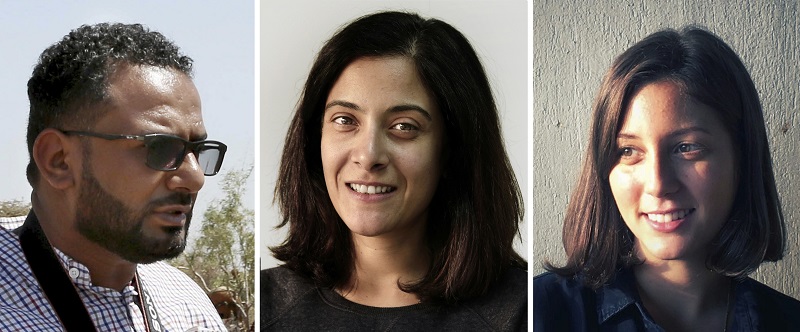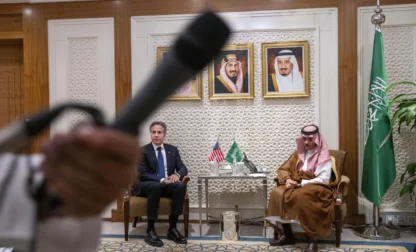By DAVID CARUSO, The Associated Press

NEW YORK (AP) — A team of three Associated Press journalists won a Pulitzer Prize in international reporting Monday for their work documenting torture, graft and starvation in Yemen’s brutal civil war.
Reporter Maggie Michael, photographer Nariman El-Mofty and video journalist Maad al-Zikry spent a year uncovering atrocities and suffering in Yemen, shining a light on a conflict largely ignored by the American public.
In a series of stories, they told of how famished people in parts of Yemen were reduced to eating leaves to stay alive while corrupt officials diverted international food aid.
Their reports documented civilian casualties of a U.S. drone campaign, drew attention to the presence of child soldiers on the front lines and showed evidence of torture by both Houthi rebels and U.S.-backed forces . For one report, Michael managed to interview seven torture victims while they were still being held prisoner.
Their images and stories, gathered at times under dangerous conditions, made a difference.
At least 80 prisoners were released from secret detention sites controlled by the United Arab Emirates after one of their reports. A Houthi leader ordered an investigation of rebel-run prisons, saying that torture was “unforgivable.”
The United Nations rushed food and medicine to areas where the AP revealed that people were starving and threatened to cut off aid to Houthi-controlled areas unless corrupt food diversions stopped.
“AP’s groundbreaking work in Yemen has drawn the world’s attention to one of the worst tragedies of our time,” said AP’s executive editor, Sally Buzbee. “Yemen is one of the most dangerous places in the world to report. And yet, again and again, this team braved those dangers to tell stories that the world heard from no other source, and with extraordinary detail.”
To do their work, the three journalists had to travel through dangerous areas, avoid groups angered by their reporting and work to protect the people who spoke with them from danger. The AP pulled Al-Zikry from Yemen in late 2018 because it was concerned about his safety, a step it had also taken in 2017.
The AP’s investigative reporting on the war in Yemen in 2018 was supported by a grant from the Pulitzer Center on Crisis Reporting.
The staff of Reuters was also awarded a Pulitzer in international reporting for an investigation of a massacre of Rohingya men and boys in a village in Myanmar. The award included a special acknowledgement for journalists Wa Lone and Kyaw Soe Oo, who were arrested in December 2017 by the Myanmar government during the course of their reporting and sentenced to seven years in prison.
The prizes were announced in New York at Columbia University.
Michael, an Egyptian based in Cairo, joined the AP in 2002. She has covered political and religious conflict in the Middle East and, as part of AP’s investigations team, has written about civilian casualties in Iraq.
Nariman Ayman El-Mofty is a Canadian-Egyptian photographer. She worked first as a photo editor, then since 2016 as a photographer covering Egypt, Yemen and other parts of the Mideast.
Al-Zikry is a Yemeni video journalist who has spent years chronicling the war and its horrors. His photograph of an emaciated infant dying at a hospital in 2016 helped bring world attention to starvation in Yemen.
They worked closely with editor Lee Keath, based in Cairo, who has covered the Middle East for the AP since 2005.
“This is a story that everybody was not really paying good attention, and we’re very happy to be able to draw some attention to it,” Michael said.
The Pulitzer covers the AP’s work on Yemen in 2018, but the team has continued its reporting. Earlier this month, Michael revealed that Yemen’s cholera epidemic has been worsened by corruption.
This is the AP’s 53rd Pulitzer overall. The last came in 2016, when the news organization won a Pulitzer for public service for an investigation of enslaved fishermen in Southeast Asia.
AP journalists were finalists for five Pulitzers in all this year, including the work on Yemen, the most since the Pulitzer board began revealing the names of finalists as well as winners in 1980.
AP photographers Noah Berger, John Locher and Ringo H.W. Chiu were finalists in the breaking news category for coverage of wildfires in California. AP photographers were finalists in the same category for coverage of clashes between Palestinians and Israelis in Gaza. The AP’s coverage of the Trump administration’s migrant family separation policies was a finalist in the national reporting category.
The AP was also among several news organizations that collaborated with Reveal from the Center for Investigative Reporting in an investigation of discrimination in the banking system. That report was a finalist in the explanatory reporting category.
___
The AP’s work on Yemen in 2018 can be found here: https://apnews.com/YemenDirtyWar .




